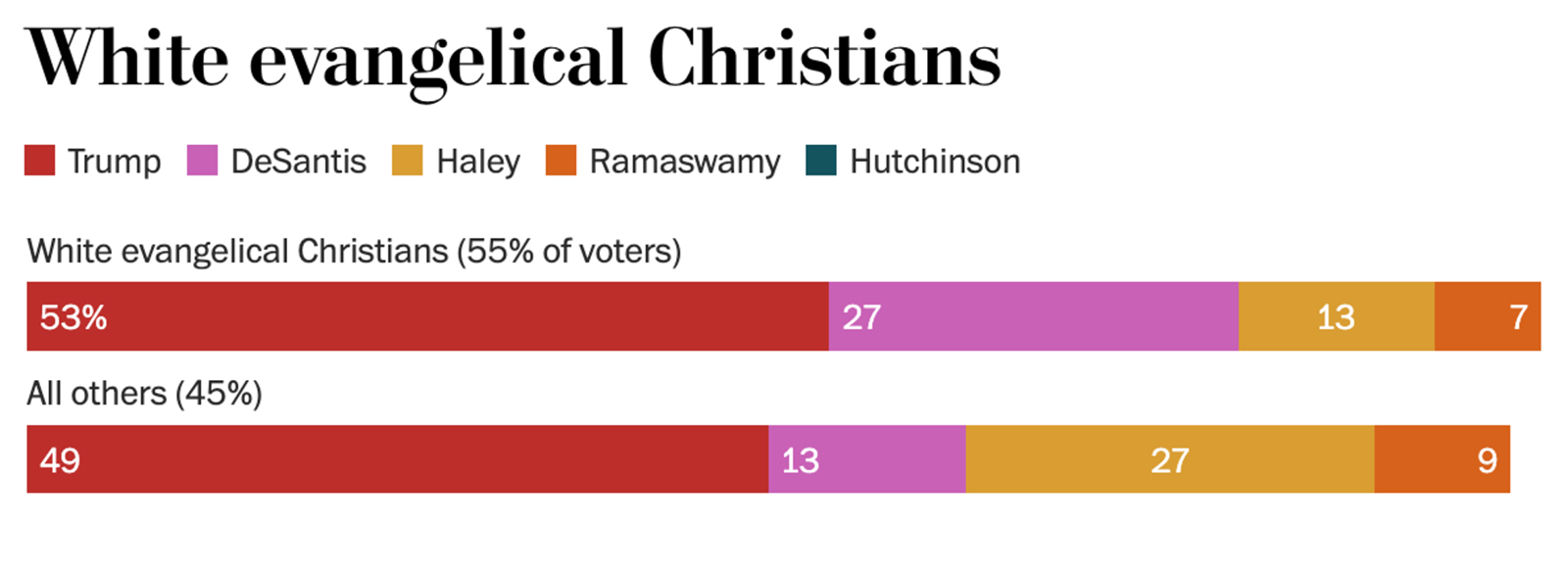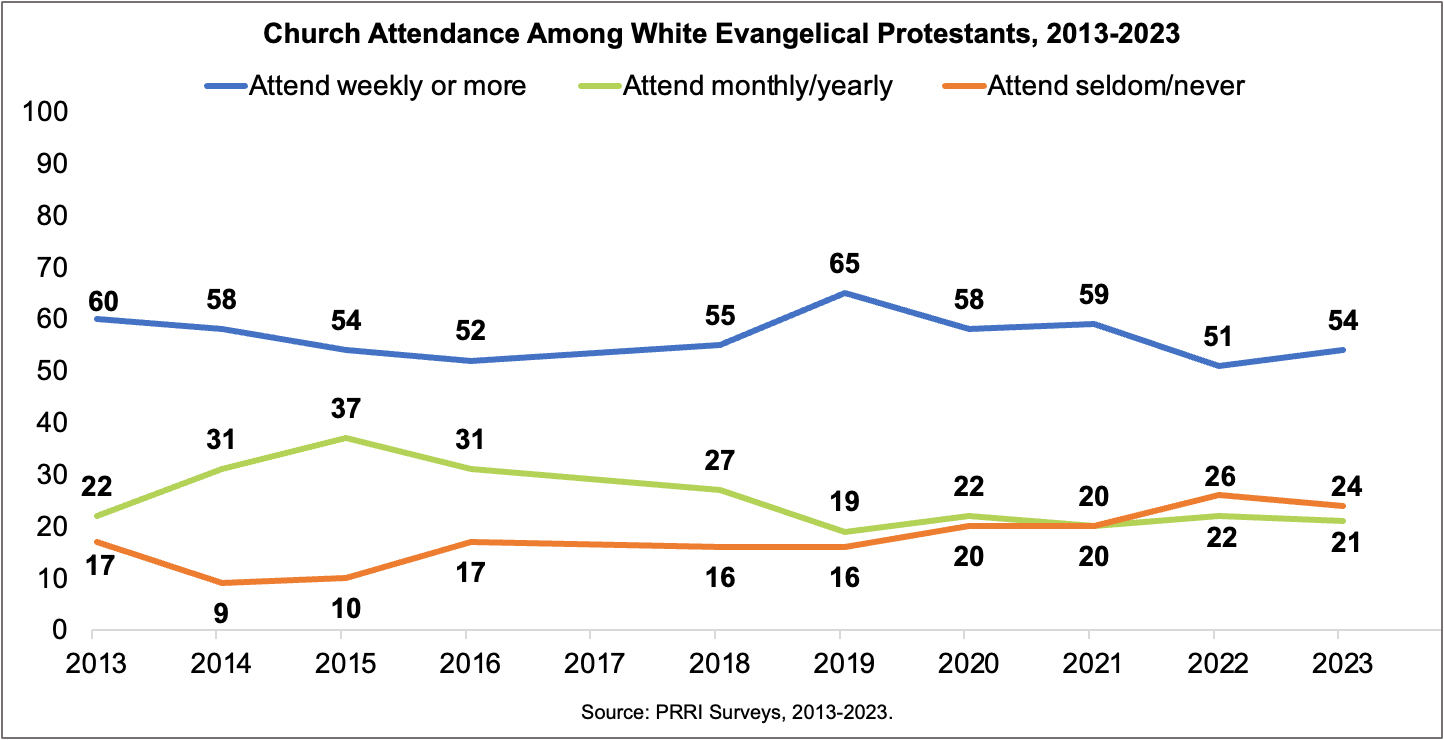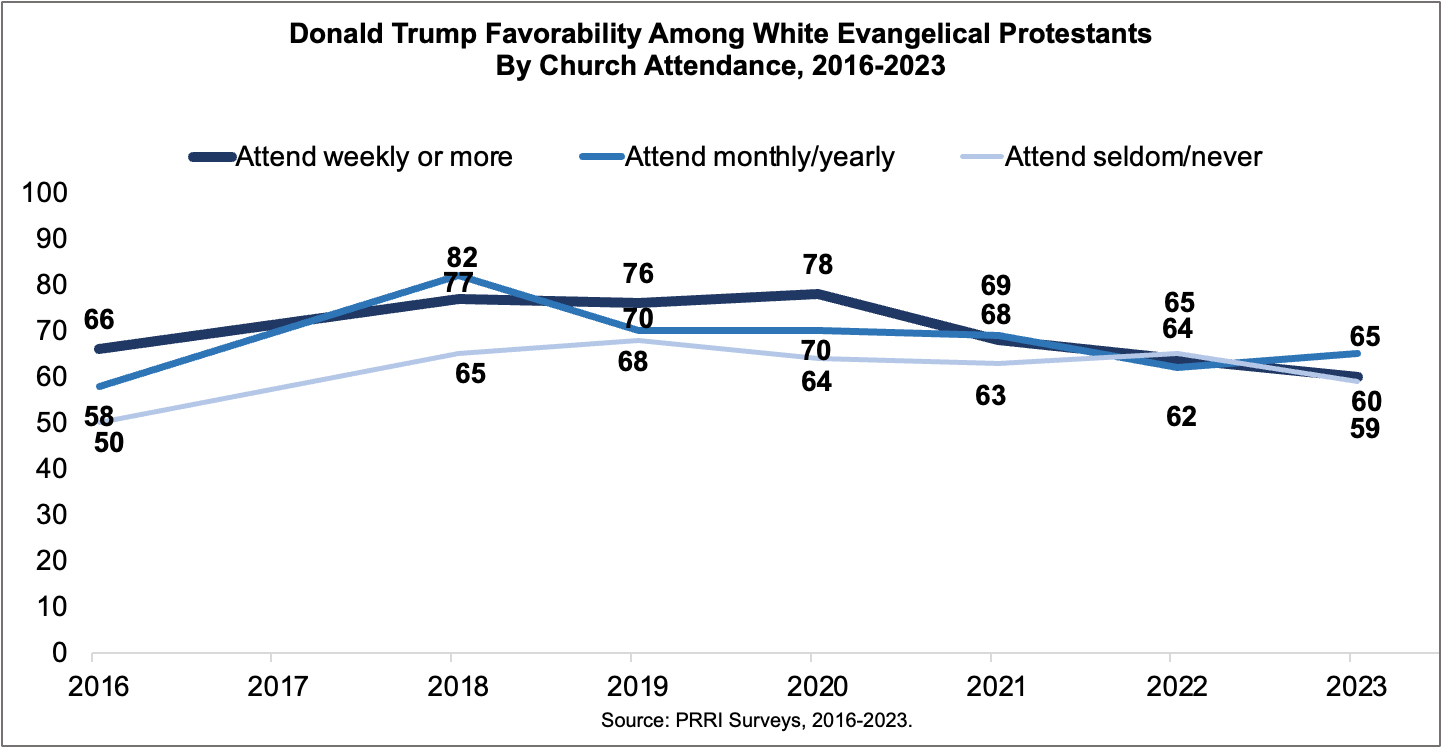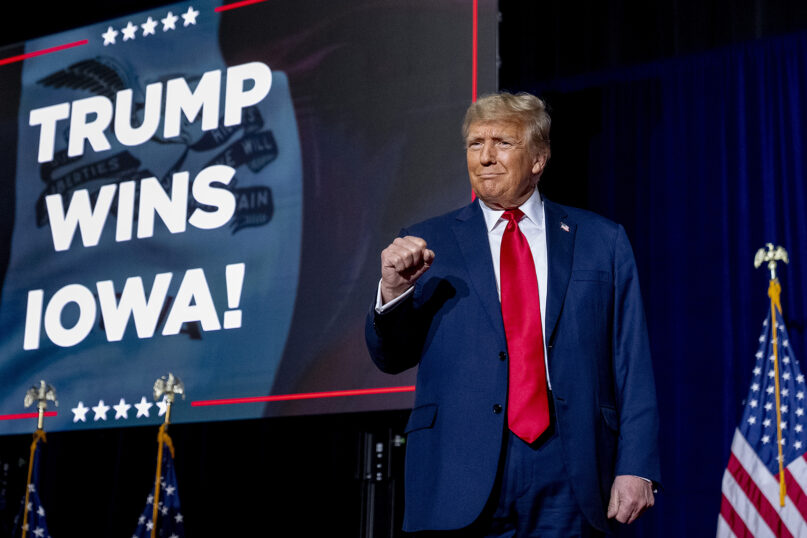(RNS) — Heading into the Iowa caucuses, the Republican presidential candidate standings looked to be as frozen as the snow-covered ground. The results from the storied Iowa Poll, conducted by J. Ann Selzer from Jan. 7 to 12, showed Donald Trump with more support (48%) than the other three top candidates combined: Nikki Haley (20%), Ron DeSantis (16%) and Vivek Ramaswamy (8%). In December, Trump enjoyed a 32-point lead vs. the 28-point lead that Selzer’s January poll indicated he held over Haley — but this minor shift is not statistically significant.
In the poll, and ultimately in the caucuses, Trump led across every demographic group, and his supporters were more enthusiastic than those of Haley or DeSantis. Notably, Haley lost to Trump even among her strongest demographics: suburbanites and white women with college degrees.
Trump and white evangelicals in Iowa
Monday’s inaugural Republican primary event gave us our first official glimpse into the ongoing love affair between Trump and white evangelicals. White evangelicals are highly influential in the Iowa Republican caucuses, comprising approximately one-third (32%) of Iowa Republicans, according to PRRI surveys. In the Iowa Poll, Trump all but locked up the nomination among this group. A majority (51%) of white evangelicals in Iowa supported Trump, compared with only 22% for DeSantis and 12% for Haley.
According to the CNN Entrance Poll, the pre-caucus Iowa Poll was right on the money. A majority of Iowa caucusgoers were white evangelical Christians (55%), and they supported Trump at a slightly higher rate than other, nonevangelical caucus participants. In fact, more white evangelicals supported Trump (53%) than the other candidates combined (27% for DeSantis, 13% for Haley, 7% for Ramaswamy). Notably, this landslide support for Trump far outpaces white evangelical support for Trump in the 2016 Iowa caucuses, when only 21% of white evangelicals supported Trump, compared with 33% who supported Ted Cruz. While we don’t have church attendance data in the CNN Entrance Poll, frequent-church-attending white evangelicals typically outnumber non-church-attending white evangelicals at the polls by a margin of more than 2-to-1.
The Iowa Poll results track with patterns in national polling, which have confirmed Trump’s dominance among white evangelical Protestants for months. For example, even among a more crowded field, PRRI’s fall 2023 American Values Survey found that 44% of white evangelical Protestant Republicans preferred Trump to be the 2024 nominee for president, compared with 23% who preferred DeSantis and 5% who preferred Haley.

“White evangelical Christians” (Graphic courtesy of Robert P. Jones)
Dispelling the zombie myth of white evangelical support for Trump
Against this backdrop of white evangelical support for Trump, a broad, unsupported hypothesis has reemerged that Trump’s stalwart continued support among white evangelicals can be explained by his strength among what I’ll abbreviate as WEINOs, or “white evangelicals in name only,” who seldom or never attend church. A version of this thesis appeared recently in a highly circulated New York Times article, which made the bold claim that “Trump is connecting with a different type of evangelical voter” beyond “the churchgoing, conservative activists who once dominated the G.O.P.”
The assertion that unchurched white evangelicals are the most supportive of Trump is not supported by the preponderance of evidence. Broken down, this myth has two components:
- The overall drop in church attendance in the general population has produced a significant increase in the number of WEINOs, white evangelicals who seldom or never attend church; and
- Support for Trump is strongest among white evangelicals who are not connected to churches.
Let’s take each of these in turn.
Myth 1: There is a large and growing number of white evangelical Protestants who do not attend church
The general assertion that church attendance has significantly declined among white evangelical Protestants is simply not supported by the evidence. In the general population, church attendance levels have indeed been dropping over the last few decades. However, church attendance levels among white evangelical Protestants have remained significantly higher than the general population. While disruptions from the COVID-19 pandemic accelerated the downward church attendance levels among many Christian groups, white evangelical churches were less impacted because many were located in states that did not have strict closure mandates, and many individual churches flouted closure recommendations as Trump politicized the pandemic.
The chart below illustrates the relatively stable church attendance levels among white evangelical Protestants, America’s most churchgoing religious group, across the last decade. There has been a modest 7 percentage-point uptick in the proportion of white evangelicals who seldom or never attend church (17% in 2023 to 24% in 2023), but these numbers are far below the proportion of the general population who have opted out of religious services (54%). And while there has been some fluctuation among the “super attenders,” those who attend church once a week or more, a majority of white evangelical Protestants still report attending church this frequently — a rate more than double the general population (54% vs. 24%).

“Church Attendance Among White Evangelical Protestants, 2013-2023” (Graphic courtesy of Robert P. Jones)
Today, only about 1 in 4 white evangelical Protestants report seldom or never attending church — a proportion far too small to move the needle on overall support for Trump, even if they were his greatest supporters. In other words, any explanation of Trump’s continued support among white evangelicals that is based on claims about an alleged “great exodus” of white evangelicals from churches is on thin ice. The numbers simply aren’t there.
Myth 2. Support for Trump is higher among unchurched white evangelicals
More importantly, since Trump first garnered the GOP nomination and was elected president in 2016, there is no basis for the claim that his support is higher among white evangelicals who are not connected to churches. In fact, the data have consistently shown the opposite: that support for Trump has been lower among white evangelical Protestants who seldom or never attend church.

“Donald Trump Favorability Among White Evangelical Protestants By Church Attendance, 2016-2023” (Graphic courtesy of Robert P. Jones)
In both the 2016 and 2020 election years, white evangelical Protestants who attended church weekly or more were, by double digits, more likely than those who attended seldom or never to hold favorable views of Trump (66% vs. 50% in 2016; 78% vs. 64% in 2020).
It is notable that the biggest drop in support for Trump since he left office has indeed come among the most frequent church attenders, where Trump favorability has dropped from a high point of 78% down to 60% at the end of 2023. Because of this dip, for the first time since Trump rose to power in the GOP, there is no statistically significant difference in support for Trump between white evangelicals who are the most tightly connected to churches and those who are staying home on Sundays. But it remains true that 6 in 10 white evangelicals continue to hold a favorable view of Trump, regardless of how often they go to church.
Pew’s 2020 validated voters study found that two-thirds of white evangelicals who voted in 2020 attended religious services at least monthly. The study similarly found no significant differences between white evangelical support for Trump by church attendance. In the 2020 presidential election, 85% of white evangelicals who attended religious services monthly or more voted for Trump, compared with 81% of those who attended less frequently.
Moreover, white evangelical Protestants who attend church weekly or more are equally as likely as those who attend church a few times a month or less to:
- Believe the big lie that the 2020 election was stolen from Trump (59% vs. 61%).
- Disagree that there is solid evidence that Trump committed serious federal crimes (69% vs. 66%).
- Disagree that the 2024 election of Trump to the White House poses a threat to American democracy and way of life (72% vs. 67%).
Stated most conservatively and plainly, church attendance levels make no difference in support for Trump among white evangelical Protestants today.
The data also indicate that Trump’s nostalgic appeal to protecting the ideal of a white Christian America resonates strongly with white evangelicals who attend church frequently. As I demonstrated in my book “White Too Long,” among white evangelicals, higher church attendance is positively correlated with core Trump impulses such as denials of structural racism, even when controlling for a range of other factors like education, gender, region, party affiliation, etc. There I concluded:
“There is no evidence that higher church attendance has any mitigating effect on racist attitudes; if anything, the opposite is true … For white evangelical Protestants, holding racist views is nearly four times as predictive of white evangelical Protestant identity among frequent church attenders as among infrequent church attenders.” (“White Too Long,” 176-177).
Among white evangelicals, PRRI research confirms frequent church attenders are also as likely as infrequent attenders to be attracted to the anti-democratic vision of white Christian nationalism. Among white evangelicals who attend church at least weekly, nearly 7 in 10 are Christian nationalists (33% Adherents, 36% Sympathizers), compared with 6 in 10 of those who seldom or never attend religious services (25% Adherents, 35% Sympathizers). Similarly, 56% of white evangelicals who attend church weekly or more, compared with 54% who attend less frequently, believe “God intended America to be a new promised land where European Christians could create a society that could be an example to the rest of the world.”
Strikingly, church-attending white evangelicals are also as likely as unchurched white evangelicals to believe true American patriots may have to resort to violence to save the country (30% vs. 32%).
After analyzing dozens of questions, I found only one topic where church attendance has a mitigating effect on Trump’s MAGA appeal. White evangelicals who attend church at least a few times a month are slightly less likely to see immigrants as a threat and to agree with the racist so-called Great Replacement Theory. Seven in 10 (70%) white evangelicals who attend church only a few times a year or less believe “immigrants are invading our country and replacing our cultural and ethnic background.” Fewer, but still a strong majority (58%), of white evangelicals who attend church at least a few times a month hold this belief. Even here, however, the differences are more a matter of degree than kind.
Here is the plain reading of the evidence: Historically, when higher church attendance levels have made a difference among white evangelicals, they have been positively correlated with higher support for Trump and his core MAGA appeals. At best, church attendance may modestly blunt the appeal of Trump’s most xenophobic rants among white evangelicals, but it ultimately makes no difference in white evangelical support for his candidacy as president.
What the myth of unchurched white evangelicals is protecting
So why does this myth about white evangelical support for Trump, despite the plain evidence to the contrary, continue to be resurrected? My strong suspicion is that this theory serves a psychological purpose: It subconsciously protects a deeply held American assumption about the positive value of church.
If church attending is a moral behavior that generates positive civic goods, then it should follow that frequent church attenders should be less attracted to a leader such as Trump, or at least to his most racist and xenophobic appeals. Asserting that Trump’s white evangelical support is being generated by those outside the church fold simultaneously resolves a paradox and absolves the church.
It’s time for the zombie hypothesis — that Trump’s evangelical support is due to a growing number of unchurched white evangelicals — to finally be laid to rest. Letting that biased theory go will allow us to have a clearer understanding not only of our politics but of our churches.
(Robert P. Jones is CEO and founder of the Public Religion Research Institute and the author, most recently, of “The Hidden Roots of White Supremacy and the Path to a Shared American Future.” This article first appeared on his Substack newsletter. The views expressed in this commentary do not necessarily reflect those of Religion News Service.)





